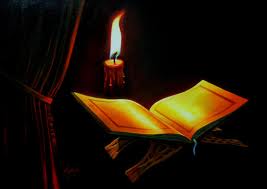
LAWS OF HISTORICAL DIALECTICS IN THE QURAN:
UNDERSTANDING SURA 13 FROM A MARXIST PERSPECTIVE
The branch of Marxism that claims to be applying the dialectical laws in history and sociology is often called historical dialectics (historical materialism).
These dialectical laws include: The law of dialectical development, the law of cause and effect, the law of evolution by natural selection and the law of economic dialectics.
On careful reading of sura 13 (sura Ra’ad) from a Marxist perspective, one can observe how these laws of historical dialectics conform with some of the Quranic concepts in this regard:
The law of dialectical development
The sura contains total 43 verses. It starts with references to the messages in cosmic evolution and natural laws (13:1-15) and indicates that the Universe with its intrinsic dual nature has gradually evolved through a process which is dialectical:
God is He who raised up the Heavens with supports invisible to you, while He is established on the throne; He has subjected the Sun and the Moon, each one pursues its course to an appointed term. He regulates the affair, explaining the messages in detail, that you may be certain of meeting your Sustainer./ And it is He who spread out the Earth, and set thereon mountains standing firm and flowing waters: and of every fruit He placed therein two opposites; He draws the night as a veil over the day. Most surely in all this there are messages indeed for a people who reflect. 13:2-3
Please note how the above associates duality with the evolving Earth within the background of an expanding, evolving Universe. Also note how the universality of this duality is expressed by the repeated mention of ‘pairs of opposites’: Heavens … and … Earth, Sun and Moon, mountains standing firm and flowing waters, two opposites within every fruit, night and day, etc. (cf. 13:4 which depicts creation as a dialectical process of diversification; also note multiple allusions to duality throughout the context, e.g. 13:4-27).
That this dichotomy, being far from anything static, itself creates a dynamics i.e. unity and conflict of opposites, is expressed e.g. by the phrases ‘and of every fruit He placed therein two opposites’ and ‘He draws the night as a veil over the day’.
Here we are informed that every fruit accommodates within itself the contradiction between two opposing counterparts.
In this context, fruit symbolizes universal dialectics. Everything in the world is a fruit in the tree of events and represents not only a product (effect) of the union of two opposites but also a source of ‘seeds’ (cause) for further procreation/ development.
The law of cause and effect
The sura then insists that the absolutely-unchangeable divine law of cause and effect surrounds every individual and every society and dominates the lives of both individuals and communities:
Present before him and behind him are hosts in succession; they guard him by divine command. Surely God never changes what is in a people unless they change what is in themselves. 13:11
Constantly enforced through an unceasing succession of cause and effect (‘hosts in succession’), the same law, often understood as the law of requital (cf. ‘sunnat Allah’; 35:43; 17:77, 33:38, 33:62, 40:85, 48:23, 6:34, 6:115, 10:64, 18:27; cf. 4:26, 3:137), makes the rise and fall of civilizations depending on people’s intrinsic qualities and the changes in ‘their inner selves’ (cf. 8:53).
The law of evolution by natural selection
The sura then narrates a parable that alludes to natural selection as an important dynamics in evolution, which further plays a decisive role in the flux of history including great historical events and social revolutions:
He sends down water from the Heaven, and the channels flow, each according to its measure, and the torrent bears away to foam that mounts up to the surface. And from what they melt in the fire for making ornaments or tools arises a scum like it. Thus does God compare the real and the false. Then the scum disappears as a worthless thing; while that which is of benefit to mankind remains on the Earth. Thus does God set forth parables. 13:17
Notice here the direct reference to ‘benefit to mankind’ regardless of religion, race, geography, creed or colour. Thus the Quran states in no ambiguous terms that the real existence on Earth is of the one who benefits humanity. Any system that is against humanity is bound to disappear and to be replaced, eventually, by the divine system that benefits humanity.
The law of economic dialectics
The sura then refers to the law of economic dialectics as an important driving force in this flux of history. Understood in Marxist terms, it is the law of the unity and conflict of the opposites in the society – i.e. the class struggle between the rich (capitalist and landowning classes) and the poor (proletariat and peasantry) – that creates the dynamic of history, leading to continuous historical growth, change and development, and is the source of progress toward a final uniformity. It is the same universal law of dialectical development, expressed in social level:
God extends provision for whom He wills, or restricts, determining according to a measure. 13:26
In other words, this duality between wealth and poverty (‘extends provision … or restricts’), being far from anything random or chaotic, follows strict natural laws (‘according to a measure’), which historical dialecticians attempt to explore and implicate in their analysis of history, economics and socio-politics.
The above laws determine the evolving social stages
The sura then refers to evolving social stages as determined by divine laws.
Marxists view society as dynamic and evolving through stages like primitive communism and tribalism, slavery, feudalism, capitalism, socialism, communism and so on.
Thus, to them, history unfolds everyday through opening of fresh pages; old socio-economic, political, legal and moral systems disappear as new systems appear in their place; every stage has its own ‘ordinance’, which is determined by the laws of Historical dialectics.
See how this important Marxist concept of social evolution finds some resonance in the sura:
… For each term there is an ordinance./ God makes to pass away whatever He wishes, and/or consolidates (whatever He wishes), and with Him is the source of ordinance. 13:38-39
Notably however, contrary to the materialistic understanding of Marxism, the Quran here immediately confirms that, whatever be the ‘ordinance’ at any stage, the Divine Database – the ultimate source of all the laws and systems – remains with God alone.
We need to study these laws
The sura then calls to observe these laws in order to better understand the nature of divine judgement:
Do they not see that We set upon the Earth and reduce it from its edges? And God judges; none repels His judgment. And swift in reckoning is He. 13:41
AT THE CORE OF ALL THESE LAWS:
THE LAW OF THE UNITY AND CONFLICT OF OPPOSITES
According to historical dialectics, at the core of all these laws remains the Law of the Unity and Conflict of Opposites, including class struggle, i.e. the dialectics in society between the rich and the poor.
This important Marxist understanding appears to be consistent with the spirit of the Quran:
And that truly to your Sustainer is the Utmost Limit;/ And that it is He who made to laugh and to weep;/ And that it is He who caused death and granted life;/ And that He has created the two opposites, male and female,/ Out of a tiny drop as it is lodged;/ And that upon Him is the next creation;/ And that it is He who enriches and impoverishes. 53:42-48
Please note above a list of dialectical opposites that includes affluence and impoverishment. Thus, when wealth is considered as a thesis, poverty contradicts it as its antithesis (‘the next creation’) and the vice versa. Then wealth and poverty mutually interact as opposing counterparts of a ‘thesis-antithesis cycle’ (‘enriches and impoverishes’) that forms an ever-growing dialectical chain of ‘negation of the negation’ …
In other words, if both rich and poor co-exist in a society, one is inevitably contradicted by the other. This creates a continuous ‘tension’ (‘class struggle’) and, therefore, a social process that tends to drive the things towards a newer level of uniformity.
However, the Quran here takes us beyond the simplistic limits of Marxist materialism by reminding us that the Utmost Limit of all the dialectical chains, including that of ‘class struggle’, is to God the Infinity alone (‘And that truly to your Sustainer is the Utmost Limit’).
Translated above as ‘the Utmost Limit’, the word ‘muntaha’ has a rich plethora of connotations that include the goal, the either extremity, the ultimate beginning and ending, the telescopic and microscopic ends, the absolute boundary, extent or limit etc. Thus ‘the Utmost Limit’ circumscribes the beginning and the end of eveything both in time and in space, as well as the source from which everything proceeds and to which everything must return.
